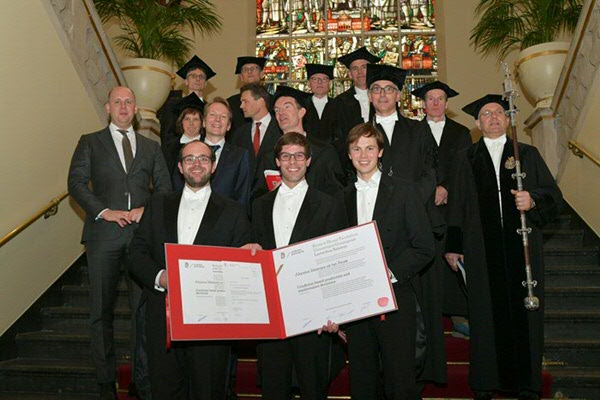PhD cum laude for Michiel uit het Broek

Last month, Michiel uit het Broek, defended his thesis “ Condition-based production and maintenance decisions “ and received the distinction ‘cum laude’.
Uit het Broek’s thesis shows that offshore wind farms can produce more efficiently by not always aiming for a high production speed. It is important to take the expected maintenance costs into account when determining the optimum production speed. The application of such a wear-based production policy results in lower maintenance expenditure and has the potential to increase the total energy production of wind farms. By coordinating the wear level of different windmills, for example, fewer sailings are required for maintenance.
For the time being, the costs for wind farms are too high to be competitive with traditional energy sources such as oil and gas. For offshore wind farms, it is mainly the maintenance costs that lead to large expenses. This is partly because it is difficult to bring technicians and parts to the right place at sea. The weather also provides an extra challenge because maintenance is often not possible due to strong winds or high waves. A promising way for cost savings is better planning of maintenance, so that windmills do not stand still unnecessarily due to unexpected failures, and at the same time are not unnecessarily maintained early.
Technological developments make it cheaper and easier to continuously and remotely observe the status of a windmill and to make it run faster or slower. Uit het Broek investigated how the relationship between the speed of rotation of a windmill and the speed at which this windmill wears out can be used to improve the performance of wind farms.
Production facilities can achieve significant cost savings by not always aiming for a high production speed but optimizing it along with maintenance planning. This has several advantages, concludes Uit het Broek.
For example, fewer maintenance actions are needed (which is also more sustainable because fewer boats have to sail), there is less uncertainty about when maintenance costs will be incurred (and it is therefore easier to plan budgets) and the total production can be increased.
Uit het Broek also shows that different wind farms should cooperate by jointly purchasing a maintenance ship. These ships are now often hired when needed, as it is too expensive to purchase a single park boat. Renting, however, gives long and uncertain planning times. This leads to large production losses if a turbine unexpectedly breaks down and high maintenance costs.
Dissertation: http://hdl.handle.net/(...)df-a11b-ff8b4e690257
More news
-
09 December 2025
Are robots the solution?
-
10 November 2025
Decentralization of youth care
